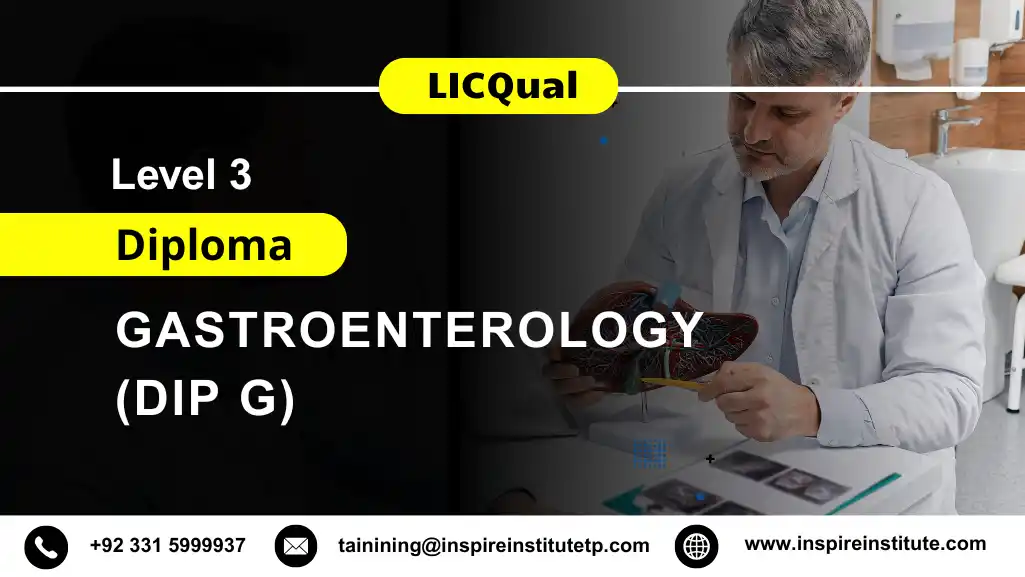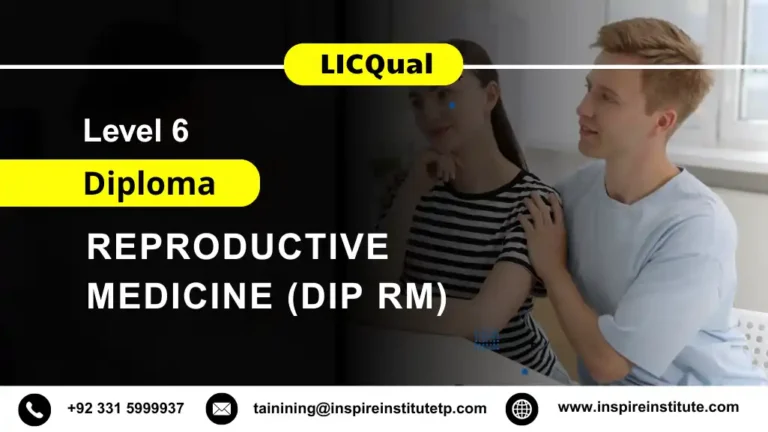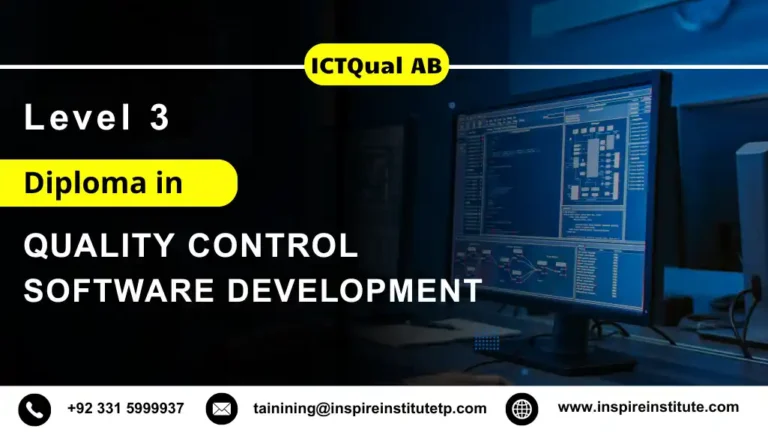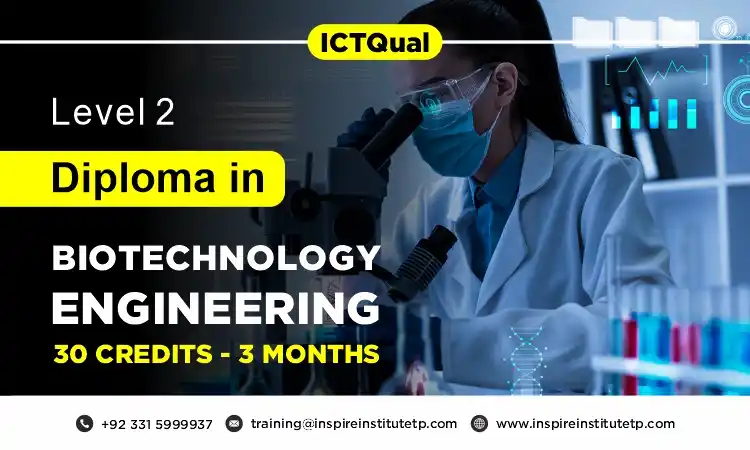LICQual Level 3 Diploma in Gastroenterology (Dip G)
The LICQual Level 3 Diploma in Gastroenterology (Dip G) provides an in-depth foundation for learners aiming to specialize in this essential field. With digestive disorders affecting millions globally, this course equips healthcare professionals, medical students, and allied health practitioners with the knowledge and skills needed to diagnose, manage, and treat gastrointestinal conditions effectively.
The primary purpose of this diploma is to deliver comprehensive theoretical knowledge alongside practical applications in gastroenterology. Learners will explore key topics such as digestive physiology, gastrointestinal disorders, liver and pancreatic diseases, endoscopic procedures, and nutrition-related gastrointestinal care. The Diploma in Gastroenterology ensures participants gain a complete understanding of the digestive system’s functions, pathologies, and modern treatment approaches, preparing them for professional practice or advanced studies.
A significant focus of the course is on practical skill development. Students will learn to assess and monitor patients with gastrointestinal conditions, interpret diagnostic results, and implement treatment protocols safely. Through case studies, simulations, and evidence-based exercises, learners acquire hands-on competence essential for hospitals, clinics, and gastroenterology units. The LICQual Dip G emphasizes real-world applications, bridging the gap between theory and clinical practice.
The course also highlights the importance of patient-centered care and professional ethics. Learners will develop effective communication strategies, understand patient confidentiality, and practice empathetic care for individuals with chronic or acute digestive disorders. Additionally, the program covers emerging trends in gastroenterology, including minimally invasive techniques and innovative therapeutic interventions, ensuring graduates stay up-to-date with industry advancements.
The LICQual Level 3 Diploma in Gastroenterology is designed for a wide range of learners, from healthcare assistants and early-career practitioners to medical students and allied health professionals. Its flexible, assignment-based structure allows participants to balance study with work or personal commitments while achieving comprehensive mastery of gastroenterology principles. Graduates gain a recognized qualification that enhances career prospects in hospitals, clinics, research institutions, and community healthcare settings.
By completing this diploma, learners acquire the expertise to make a meaningful impact in digestive healthcare. The LICQual Dip G equips students with practical skills, scientific knowledge, and professional competence to deliver high-quality gastroenterology care. This qualification not only advances careers but also contributes to improved patient outcomes, making it a vital credential for anyone dedicated to excellence in gastroenterology and digestive health management.
Why Choose this Qualification
The LICQual Level 3 Diploma in Gastroenterology (Dip G) is a specialized qualification designed to build essential knowledge and skills for those aspiring to work in digestive and gastrointestinal healthcare. Gastroenterology is a vital field of study that focuses on the diagnosis, treatment, and management of digestive system disorders, including conditions affecting the stomach, intestines, liver, pancreas, and associated organs. Choosing this diploma not only strengthens your academic and professional foundation but also prepares you for a meaningful career where you can make a significant impact on digestive health and patient care.
Key Reasons to Choose this Qualification
Comprehensive Understanding of Gastroenterology:
- Gain an in-depth foundation in digestive system anatomy, physiology, and gastrointestinal function.
- Learn about the diagnosis and management of common gastrointestinal disorders and liver or pancreatic diseases.
- Study preventive healthcare strategies, nutrition management, and lifestyle interventions for digestive health.
- Understand the principles of endoscopic procedures, clinical investigations, and disease monitoring in gastroenterology.
Practical Skills for Real-World Healthcare:
- Acquire hands-on knowledge to assess and monitor patients with gastrointestinal conditions effectively.
- Learn essential techniques for managing digestive emergencies and providing clinical support.
- Apply evidence-based practices in treating acute and chronic gastrointestinal illnesses.
- Develop problem-solving and decision-making skills through case studies and clinical scenarios.
Career-Ready Qualification:
- Enhance employability with recognized skills in gastroenterology and digestive healthcare.
- Prepare for roles in hospitals, gastroenterology clinics, research centers, and community healthcare settings.
- Build a strong foundation for progressing into advanced medical, nursing, or digestive health studies.
- Demonstrate professional competence through an internationally accredited qualification.
Strong Focus on Patient-Centered Care:
- Develop communication skills for interacting with patients experiencing digestive disorders.
- Learn to apply empathy, ethical practices, and cultural considerations in gastroenterology care.
- Understand patient education techniques for promoting digestive health and lifestyle modifications.
- Gain confidence in supporting patients through treatment plans, preventive strategies, and follow-up care.
Internationally Recognized Qualification:
- Earn a diploma awarded by LICQual, known for its high academic and professional standards.
- Open opportunities for global healthcare careers in gastroenterology and digestive medicine.
- Gain credibility and recognition among employers, peers, and professional bodies.
- Use this diploma as a stepping stone for advanced healthcare certifications or specializations worldwide.
Flexible and Structured Learning:
- Benefit from a structured curriculum designed for progressive learning.
- Learn at your own pace with assignment-based assessments that evaluate knowledge and practical competence.
- Access study materials and resources tailored to gastroenterology and digestive healthcare.
- Balance study with professional or personal commitments while achieving academic excellence.
Ethical and Professional Development:
- Gain insights into professional codes of conduct in gastroenterology and patient care.
- Understand patient confidentiality, rights, and ethical considerations in digestive healthcare.
- Learn to make responsible decisions in complex clinical situations.
- Develop leadership qualities and professional confidence for future growth in healthcare roles.
Contribution to Society and Digestive Health:
- Play a direct role in improving digestive health outcomes in communities.
- Support initiatives for better nutrition, lifestyle, and disease prevention programs.
- Build a career with both personal satisfaction and professional impact.
- Contribute to reducing gastrointestinal disease prevalence through skilled clinical practice and patient education.
The LICQual Level 3 Diploma in Gastroenterology (Dip G) is more than an academic qualification; it is a pathway to a rewarding career in digestive healthcare. With its combination of theoretical knowledge, practical skills, ethical training, and international recognition, this diploma empowers learners to make a meaningful impact in gastroenterology. By choosing this qualification, you are investing in your professional development while contributing to the health and well-being of patients worldwide..
Course Overview
LICQual UK Awarding Body
Average Completion Time:
4-12 Months
Study Units: 6 Units
Evidence & Assignment Based
Mandatory Units
Who Should Take This Course
The LICQual Level 3 Diploma in Gastroenterology (Dip G) is a specialized qualification designed for individuals who are passionate about digestive health and aspire to build a strong foundation in gastroenterology. Gastroenterology is a critical field of study that focuses on the diagnosis, treatment, and management of disorders affecting the digestive system, including the stomach, intestines, liver, and pancreas. Choosing this diploma not only strengthens your academic and professional foundation but also prepares you for a meaningful career where you can make a lasting impact on digestive health and patient care.
Key Reasons to Choose this Qualification
Comprehensive Understanding of Gastroenterology
- Gain an in-depth foundation in gastrointestinal anatomy, physiology, and digestive system function.
- Learn about the diagnosis and management of common digestive disorders and liver or pancreatic diseases.
- Study preventive healthcare practices such as nutrition management and lifestyle interventions for digestive health.
- Understand the principles of endoscopic procedures, clinical investigations, and disease monitoring in gastroenterology.
Practical Skills for Real-World Healthcare
- Acquire hands-on knowledge to assess and monitor patients with gastrointestinal conditions effectively.
- Learn essential techniques for managing digestive emergencies and providing clinical support.
- Apply evidence-based practices in treating acute and chronic gastrointestinal illnesses.
- Develop problem-solving abilities through case studies and clinical scenarios.
Career-Ready Qualification
- Enhance employability with recognized gastroenterology and digestive healthcare skills.
- Prepare for roles in hospitals, gastroenterology clinics, research centers, and community healthcare settings.
- Build a strong foundation for progressing into advanced medical, nursing, or digestive health studies.
- Demonstrate professional competence through an accredited international qualification.
Strong Focus on Patient-Centered Care
- Develop communication skills for interacting with patients experiencing digestive disorders.
- Learn to apply empathy and ethical practices in gastroenterology care.
- Understand cultural and social considerations in digestive health management.
- Gain confidence in supporting patients through treatment plans, preventive strategies, and follow-up care.
Internationally Recognized Qualification
- Earn a qualification awarded by LICQual, known for its high academic standards.
- Open opportunities for global healthcare careers in gastroenterology and digestive medicine.
- Gain credibility and recognition among employers, peers, and professional bodies.
- Use this diploma as a stepping stone for advanced healthcare certifications worldwide.
Flexible and Structured Learning
- Benefit from a structured curriculum designed for progressive learning.
- Learn at your own pace with assignment-based assessments that test understanding.
- Access study materials and resources tailored to gastroenterology and digestive healthcare.
- Balance study with professional or personal commitments.
Ethical and Professional Development
- Gain insights into professional codes of conduct in gastroenterology.
- Understand patient confidentiality, rights, and ethical guidelines in digestive healthcare.
- Learn to make responsible decisions in complex clinical situations.
- Develop leadership qualities for future growth in healthcare roles.
Contribution to Society and Digestive Health
- Play a direct role in improving digestive health outcomes in communities.
- Support initiatives for better nutrition, preventive healthcare, and disease management.
- Build a career with both personal satisfaction and professional impact.
- Contribute to reducing gastrointestinal disease prevalence through skilled practice.
The LICQual Level 3 Diploma in Gastroenterology (Dip G) is more than just an academic qualification; it is a pathway to a rewarding career in healthcare. With its blend of theoretical knowledge, practical skills, ethical training, and global recognition, this diploma empowers learners to make a significant impact in gastroenterology. By choosing this qualification, you are investing in your professional growth while contributing to the health and well-being of patients worldwide.
Course Benefits
The LICQual Level 3 Diploma in Gastroenterology (Dip G) provides significant benefits for individuals seeking to build expertise in digestive health, gastroenterology practices, and clinical management of gastrointestinal disorders. By combining essential theoretical knowledge with practical applications, this diploma equips learners to deliver high-quality gastroenterology care, manage common digestive disorders, and support preventive healthcare strategies. Designed as a flexible, assignment-based programme, it ensures professional development while maintaining academic excellence and relevance in today’s healthcare sector.
Key Benefits of the Course:
- Specialist Knowledge: Gain a solid foundation in gastrointestinal anatomy, physiology, and digestive system function. Learners explore the diagnosis and management of common digestive disorders, liver and pancreatic diseases, and chronic gastrointestinal conditions. The course also covers preventive healthcare practices, nutrition management, and patient-centered gastroenterology practices, preparing learners to make informed and evidence-based decisions in digestive healthcare.
- Practical Application: Develop practical skills in assessing patients with digestive conditions, interpreting diagnostic results, and supporting early intervention. Learners gain competence in managing gastrointestinal emergencies, providing clinical support, and applying best practices in hospitals, clinics, and community settings. The programme ensures graduates can apply theory directly to real-world gastroenterology healthcare.
- Recognised Qualification: Earn a UK-accredited diploma that validates advanced knowledge in gastroenterology and strengthens professional credibility. This recognition ensures alignment with international healthcare and gastroenterology standards, making the qualification valuable for careers in hospitals, gastroenterology clinics, research centers, NGOs, and educational institutions worldwide.
- Flexible Learning Pathway: Benefit from an assignment-based study model that allows learners to continue professional or personal responsibilities while advancing academically. This flexible approach makes the LICQual Level 3 Diploma in Gastroenterology (Dip G) ideal for healthcare assistants, medical students, and career changers seeking a structured yet accessible programme.
- Evidence-Based Training: Explore the latest guidelines in digestive healthcare, nutrition, and preventive medicine, ensuring that learners can adopt patient-centered, safe, and effective approaches. Training emphasizes early diagnosis, disease monitoring, and evidence-driven healthcare interventions that support both individual patients and wider community health outcomes.
- Career Development: Expand career opportunities across hospitals, gastroenterology clinics, community health centers, research institutions, and international healthcare organizations. The diploma opens pathways into roles in gastroenterology support, digestive healthcare, and allied medical services, as well as further advanced studies in medicine, nursing, or gastroenterology.
- Enhanced Gastroenterology Care Delivery: Contribute to better digestive health outcomes through early detection, accurate care, and preventive healthcare strategies. Learners acquire the skills to support patients, promote wellness, and manage gastrointestinal health challenges, ultimately improving community health and patient quality of life.
- Professional Growth: Strengthen clinical knowledge, decision-making, and communication skills needed to interact effectively with patients and families. The course also builds professional values such as empathy, ethics, and interdisciplinary collaboration, preparing learners to play a crucial role in gastroenterology healthcare delivery.
The LICQual Level 3 Diploma in Gastroenterology (Dip G) equips learners with vital knowledge, practical competence, and a UK-recognised qualification. It empowers healthcare professionals and aspiring practitioners to improve digestive health outcomes, contribute to public health initiatives, and advance their careers in the rewarding and impactful field of gastroenterology.
Eligibility Criteria
The LICQual Level 3 Diploma in Gastroenterology (Dip G) is a UK-accredited programme designed for aspiring healthcare professionals, nurses, caregivers, and community health practitioners who wish to develop a strong foundation in digestive health, gastroenterology, and clinical management of gastrointestinal disorders. This assignment-based qualification combines essential theoretical knowledge with practical applications, making it ideal for medical students, healthcare assistants, allied health professionals, and individuals looking to specialize in gastroenterology. By meeting the entry requirements, learners ensure they are fully prepared to succeed in the programme and apply their knowledge effectively in hospitals, clinics, research centers, and community healthcare settings.
Educational Background:
Applicants should hold a recognised healthcare or science-related qualification such as a diploma in healthcare practice, nursing, clinical science, or an equivalent qualification. Candidates with Level 2 or Level 3 qualifications in healthcare, biology, clinical science, or related fields may also be considered. Equivalent international qualifications will be reviewed on a case-by-case basis to ensure they meet the suitability standards for the programme.
Professional Experience:
While previous experience in gastroenterology, digestive health, or general healthcare is beneficial, it is not strictly mandatory. A minimum of one year of healthcare, caregiving, or clinical experience is recommended. Applicants with exposure to hospital care, nursing support, or clinical assistance in gastrointestinal care will find the course particularly valuable, though motivated individuals without direct experience are also encouraged to apply.
Age Requirement:
Learners must be at least 18 years of age at the time of enrolment, ensuring they possess the maturity, responsibility, and commitment required for training in gastroenterology. This requirement ensures that candidates can engage effectively with both the academic and practical aspects of the qualification.
Language Proficiency:
Since the programme is delivered in English, learners should demonstrate strong reading, writing, and communication skills. A minimum IELTS score of 6.0 or an equivalent qualification is recommended for non-native English speakers. This ensures learners can complete assignments, engage with course resources, and interact professionally in academic and healthcare contexts.
Technical Requirements:
Applicants should have access to a computer or laptop with a stable internet connection. Basic IT skills are necessary to manage online learning platforms, conduct research, and submit assignments digitally. Familiarity with using word processing tools and accessing digital study resources will support a smoother learning experience.
Required Documents:
Submission of a valid ID or passport, proof of educational qualifications, and evidence of any healthcare or related professional experience (if applicable) is required for registration. Applicants presenting international qualifications may be asked to provide additional documentation for verification.
The Qualification Process
LICQual Level 3 Diploma in Gastroenterology (Dip G) follows a structured pathway to ensure learners gain comprehensive knowledge, practical skills, and professional competence in community oral healthcare.
Step 1: Self-Assessment
Learners review the entry requirements to confirm eligibility. Candidates with a background in dentistry, oral health, or public health are encouraged to apply.
Step 2: Registration
Complete the registration process by submitting required documents such as proof of qualifications, a valid ID, and payment of enrollment fees.
Step 3: Induction
An induction session is conducted to:
- Verify learner eligibility and documentation.
- Introduce study materials, learning outcomes, and assessment procedures.
Step 4: Learning and Evidence Submission
Learners complete assignments, case studies, and practical exercises demonstrating competence in public health dentistry, community oral health assessment, preventive strategies, and program planning.
Step 5: Feedback and Revision
Assessors review submitted evidence and provide constructive feedback. Learners can revise and resubmit work to meet all required standards.
Step 6: Competence Validation
Final submissions are evaluated to confirm that learners have met all theoretical and practical learning outcomes.
Step 7: Internal Quality Assurance (IQA)
The IQA team reviews the assessment process to ensure accuracy, fairness, and compliance with international standards.
Step 8: External Verification (EQA)
External verifiers validate the authenticity and quality of learner achievements.
Step 9: Certification
Upon successful verification, learners are awarded LICQual Level 3 Diploma in Gastroenterology (Dip G) , demonstrating advanced proficiency in community oral healthcare and preparing them for professional growth in dental public health, preventive dentistry, and healthcare policy.







